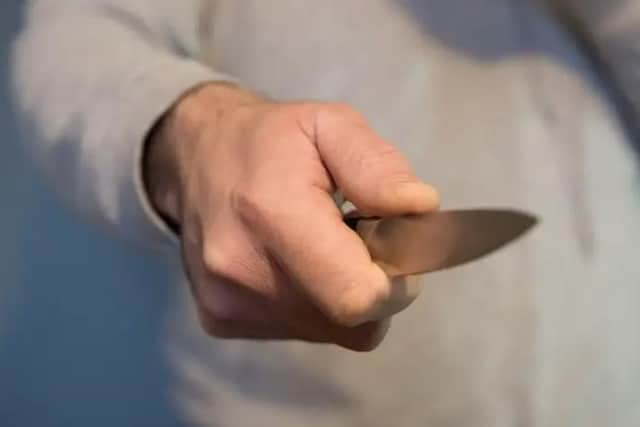Stabbings behind hundreds of hospital admissions in Hertfordshire
and live on Freeview channel 276
Assaults with knives and other sharp objects led to hundreds of hospital admissions involving Hertfordshire residents in less than a decade.
Anti-knife crime charity the Ben Kinsella Trust called for more to be done to educate children about the impact of knife crime, with two in five stabbing admissions across England involving young people.
Advertisement
Advertisement
Between April 2012 and March this year, there were around 415 admissions of patients from the Hertfordshire policing area following an assault with a sharp object, according to data from NHS Digital.


Of those, around 44 per cent involved people aged under 25.
Around 45 admissions followed attacks on people from the area in 2020-21 – the most recent period with complete data.
Figures are rounded to the nearest five to protect patient confidentiality.
The police force covering the patient's area of residence is recorded, meaning the assault could have happened elsewhere.
Advertisement
Advertisement
Knife related crime remains lower in Hertfordshire than in other parts of the country, but the campaign aims to reinforce the message that carrying a knife is illegal and will not help to keep you safe.
During the week the force are be conducting activities aimed at reducing knife crime, including conducting knife sweeps and talking to retailers about making sure knife sales are age checked, as well as educating young people about the dangers of carrying a knife.
Detective Chief Inspector, Graeme Walsingham from Hertfordshire Constabulary’s Crime Reduction and Community Safety team, said: “Our data shows that knife-related violent offences have been falling in the county over recent months.
"However, it has been increasing across the country for some time and we have seen the same trends in Hertfordshire over the last two or three years as well.
Advertisement
Advertisement
“Hertfordshire Constabulary has been working with local partner agencies to develop a countywide Serious Violence Strategy in response to this issue.
"This has included research into what drives, predominantly young people, into making these decisions and to form a proactive problem solving approach that tackles these issues.
"As a result of this work we have been focussing on preventing these things happening at a much earlier stage, by ensuring that our young people are given the information, guidance and support they need to make educated choices and avoid being sucked into these kinds of crimes.
“Over the last few years we have been running initiatives around the county, working with schools and giving talks to students.
Advertisement
Advertisement
"We have also set up a dedicated Gangs and Schools team to work with our young people, who may be at risk of becoming involved in crime, to encourage them to make positive choices.
"The team have been running our #LivesnotKnives campaign, an initiative working with a range of different organisations, including local sports clubs, musicians and charities to encourage young people to engage in sports and other positive activities.
"They also run regular online events with invited guests, who share their real experience of gangs and violent crime, often taking questions and giving true accounts of the consequences of becoming involved in this type of crime.
“Regular national weeks of action on knife crime also provide a great opportunity to get knives off the streets through amnesties, knife detection operations, weapon sweeps in public areas and test purchasing operations at knife retailers.
Advertisement
Advertisement
“Young people or who are concerned about knife crime can get confidential advice by visiting www.fearless.org.”
A spokesman for the National Police Chiefs' Council said knife crime was a policing priority nationally and that early intervention played a vital role in stopping young people from becoming involved in crime.
He added: "Preventing people from carrying knives is not something that police forces can do alone – it requires schools, charities, the health service and community groups to work together.
"It is through engagement and working with partners that we can deliver long-lasting change and ensure young people can see the devastating effects carrying a knife can have."
Advertisement
Advertisement
Patrick Green, CEO of the Ben Kinsella Trust – a knife crime charity established in memory of a young stabbing victim – said the statistics were "shocking".
He said: "These figures show that knife crime remains a significant problem for the criminal justice system and the NHS.
"But more worryingly, they show that we are failing to protect young people.
"We need to do far more to educate young people about the dangers of knife crime."
Advertisement
Advertisement
Separate Home Office crime figures for England and Wales show 262 people lost their lives to a blade in the year to June, with nearly 47,000 serious knife crimes recorded in that time.
In Hertfordshire police recorded 706 serious knife crimes over the same period, including four murders, 307 assaults involving injury and 13 knife-related rapes or sexual offences.
The NPCC spokesman said tactics such as stop and search and the targeting of habitual knife carriers contributed to the rising number of offensive weapon crimes nationally.
He added: "We believe that with the addition of officers to the service and investment into new Violence Reduction Units, informed by active communities, we can play our role in preventing more tragic deaths.”
Advertisement
Advertisement
A Government spokesman said the introduction of a Serious Violence Duty would ensure all parts of the public sector worked together to protect people from harm.
He added: "Every life lost to knife crime is a tragedy that didn’t have to happen.
"That's why we are putting 20,000 more police officers on our streets and also giving them greater powers of stop and search, so that more dangerous weapons can be seized and more lives saved."
